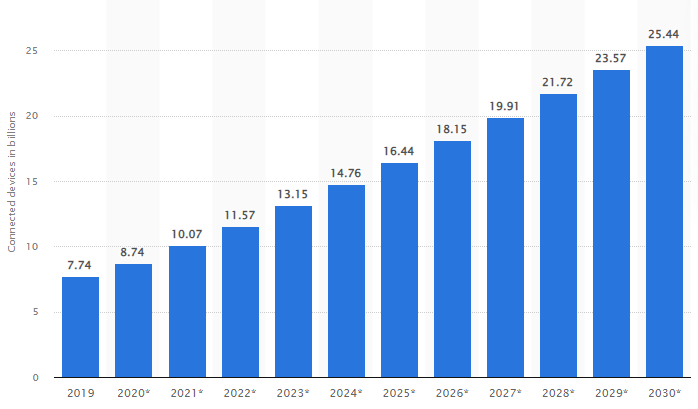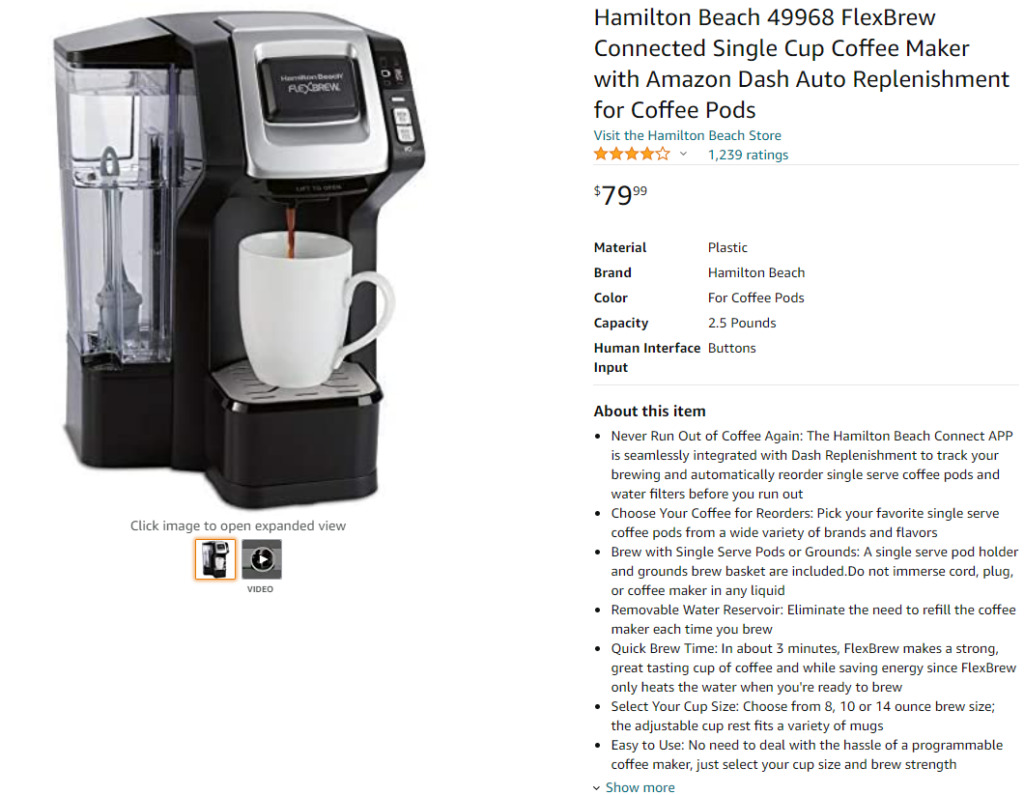The days when a customer had the only option of going to a brick-and-mortar store or market to buy something are gone. Shopping became smart and convenient: people can easily order things from their own homes. Moreover, the online shopping processes never stop improving. And the Internet of Things (IoT) technologies play a vital role in this. IoT-enabled online ordering systems can improve the customer experience and efficiency for eCommerce businesses.
In simple terms, the IoT can be described as an ecosystem of intelligent devices connected to the network and communicating with each other. These technologies are revolutionizing eCommerce by transforming business processes.
As of December 2020, the number of IoT-connected devices was 8.74 billion, and it’s expected to grow every year.
Number of IoT connected devices worldwide from 2019 to 2030 (in billions)

What is the reason for such a rapid popularity growth of IoT technology in the eCommerce field? Frankly, there’s a range of benefits, including the following:
- enhancing customer experience;
- reducing expenses;
- increasing security level.
What are the main directions of IoT applications for online retail? Let’s discuss this below.
The Three Key Methods of IoT Usage in Online Retail
Here are 3 of the most promising examples of applying IoT in eCommerce.
1. Tightening the Relations Between Manufacturers and Customers
The Internet of Things is increasingly being used to provide and maintain communication between manufacturers and consumers. For example, these technologies drive sales to customers who have already purchased something from the brand.
How does it work?
Communication between devices allows automating the supplies ordering process. This ensures that inventories, such as printer ink or coffee machine pods are constantly restocked, never to run out. IoT in eCommerce requires a robust IT infrastructure to support the collection, processing, and analysis of data from IoT devices. Subscription services determine how often you buy certain items and order them in advance from the supplier.
One of the most popular systems of this kind is Amazon’s Dash Replenishment Service. For example, this is implemented in the Hamilton Beach 49968 FlexBrew Connected Single Cup Coffee Maker to automatically order coffee pods and water filters on Amazon before you run out.
The device links to Amazon’s system by installing the app on the smartphone and connecting via your home WiFi.

How does this change the world of trade? The IoT strengthens the connection between the consumer and the seller and shapes new business principles. Furthermore, it sets the ordering processes on track, promising the vendor steady income.
2. Enhancing Logistics and Making the Customer Service More Efficient
Infographic created by Track Your Truck, a GPS vehicle tracking devices provider
IoT capabilities provide maximum transparency in the order fulfillment process, guaranteeing a higher level of service to the customers. This is especially important in pandemic times when more and more people prefer to buy online.
IoT makes it possible for eCommerce business owners to track order processing at all stages: from the moment an order is placed on the online storefront to its delivery to the buyer.
In addition to the traditional delivery methods, two relatively new options have been gaining popularity lately:
- Automated delivery vehicles;
- Delivery via drones.
Due to certain complicating factors, drone delivery is currently not widely used and is mostly in test mode. Last year, though, Alibaba celebrated its one-millionth eCommerce delivery by driverless robots.
China’s Alibaba unveils autonomous logistics robot
How will this alter the world of trade? To say the least, thanks to IoT, we’ll be seeing more self-driving electric delivery vehicles handle everyday tasks. In turn, it will result in fewer carbon emissions, less harm to the environment, better logistics and efficiency, among other benefits.
3. Personalizing the Shopping Experience in Combination with the Artificial Intelligence Capabilities
The popularization of IoT technologies allows retailers to gain more data about their target audience. They can use this information to influence customer behavior and decision-making.
In addition, user data from different devices allows sellers to get to know the customers better and modify marketing strategies accordingly. For example, it helps personalize the shopping experience, motivating people to purchase.
What kind of user data do eCommerce companies collect through smartphones, smartwatches, fitness bracelets, smart home appliances, etc.?
- Shopping preferences and interests;
- Order history;
- Behavioral patterns.
Retailers process and analyze user information and then use it for their own purposes to increase sales and profit. Digital venture startups are leveraging the power of IoT to create innovative and transformative eCommerce experiences for customers. However, this personalized approach is beneficial not just for sellers but also for buyers. Consideration of customers’ interests in online shopping makes their lives easier and saves time.
As an illustration of how this works, let me give you a simple real-life example. I was browsing for Valentine’s Day gift ideas on my laptop. A few minutes later, I was scrolling through Instagram stories on my smartphone and saw an ad by The M Jewelers brand with products on the celebration theme.

In this case, the personalization of ads allows the seller to get more profit, and consumers will choose the gifts more easily. Hence, IoT is already playing an important role in delivering customers a more personal omnichannel experience, becoming more and more vital to buyers.
To Sum Up
As more and more people prefer online shopping to brick-and-mortar stores, it is essential for eCommerce business owners to invent innovative solutions. So, in addition to basic things like enhancing eCommerce search UX, developing an attractive design, applying different marketing strategies, and so on, they employ more advanced solutions.This is necessary to stay afloat in today’s highly competitive market and meet customers’ growing demands. And one of the most progressive approaches to achieving these goals is leveraging IoT opportunities. There is no doubt that IoT is transforming eCommerce drastically already, but this is just the beginning. The future of IoT use is very promising, and the online retail sphere will benefit from it even more than it has so far. So it’s worth thinking about finding the best IoT solution for your company today.
